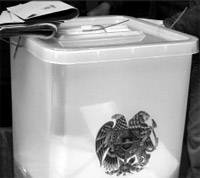On the one hand, the official statistics is publishing official reports and trying to imitate that the situation is getting better in the country, on the other hand the same situation is so bad that the official statistics is simply unable to hide the real picture.
The National Statistics Service has published a report entitled “Food availability and poverty”, which contains very interesting information. This report does not include the statistics on 2011 but the information concerning 2008-2010 is enough to understand what the “development” was.
Let’s start from poverty. In 2008 the official statistics on poverty was 27.6%, in 2009 – 34.1%, and in 2010 it reached 35.8%. The level of extreme poverty in 2008 grew from 1.6% to 3%. However, the indicators that the statistics service has used to define the red line below which is the extreme poverty (less than 19,000 drams income a month) is disputable. Another important indicator describing the economic situation is the Gini ratio, which shows the differences between groups of the society according consumption, income and richness. In other words, it shows the level of social polarization. The smaller the ratio is, the less the polarization is. According to the official information, the Gini ratio was 0.339 in 2008, and in 2010 it was 0.362. The Gini ratio for consumption was 0.242 in 2008, and in 2010 it was 0.265. This means that even the official statistics reports that during the past years the polarization in incomes and consumption has grown.
There is another indicators that speak of inequality as well. During the past years the living conditions of people have not improved. Who is responsible for the living conditions of people? Of course the authorities. What the official statistics reports shows that the society does not have reasons to trust in the incumbent government. According to official information, 1/3 of people in the country are poor. According to non-official information, the poverty level even reaches 50-55%.
It is logical that at least half of the society should not like the incumbent government and should want a change. Meantime, it is clear that real changes can take place only in case of change of the authorities because it is not realistic to expect a change from a government that has been failing during the past years. In addition to social reasons there are other reasons as well (political, economic, legal, etc.).
The picture becomes really funny when we compare these indicators with the results of pre-election surveys. On the threshold of elections again Aharon Adibekyan is publishing his genius survey results. During a press-conference on February 22 Aharon Adibekyan said that during the upcoming elections the RPA and PA were going to be the favorites of voters. According to Adibekyan, if elections were to take place last Sunday, 39% of voters would vote for the RPA, and 36% – for the PA, 8,5% – for the ANC, and 5,1% for the LS and Heritage parties taken together. According to Adibekyan, the three parties of the coalition have about 80% of the votes. In consideration of the fact that poverty is growing in the country and there is a high level of unemployment, we may assume that either Adibekyan is lying or most of Armenia’s people are masochists, i.e. the worse the government makes the situation of the people, the more votes they give to the government.
However, Adibekyan tried to explain and justify his findings, “Who has stayed in Armenia? Those who complain have left Armenia. Those who were not able to adapt have left. Those who have stayed here have adapted to this situation and they are against change as they are afraid of change. Stability and hope to the future are two factors that keep people on their land,” said the sociologist and added that state officers and people involved in trade have got used to this situation and do not want change.
If we believe this man, it means that only those people have stayed in the country who have adapted to the situation and are afraid of change, and prefer living like this in the future as well. Even more, according to this man, Armenians are divided in two parts – “conformists” and “people who complain all the time”. If so, it is logical that in case of having such majority groups in the country their most famous sociologist would be Aharon Adibekyan. The worst thing is that as a rule the results of this man’s surveys are close to the results of elections. It is hardly possible that this time the CEC may publish other figures. In other words, even if it is too sad, the upcoming elections will again show that we have a syndrome of “electoral masochism”.

